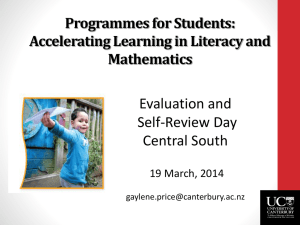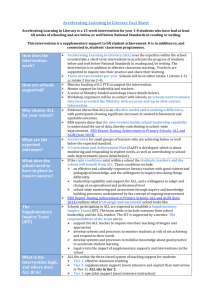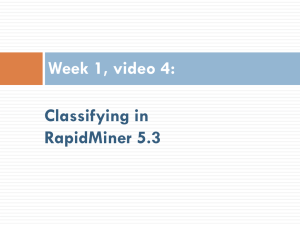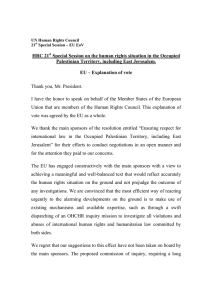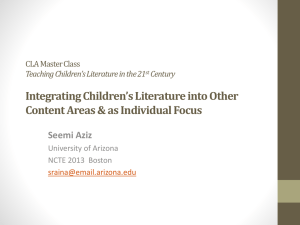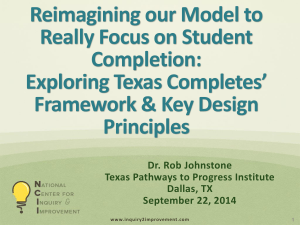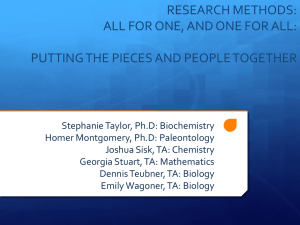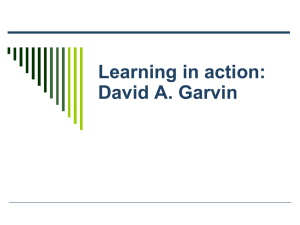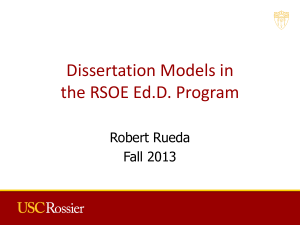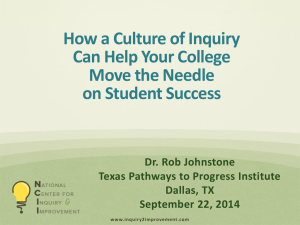Accelerating Learning in Literacy and Mathematics
advertisement
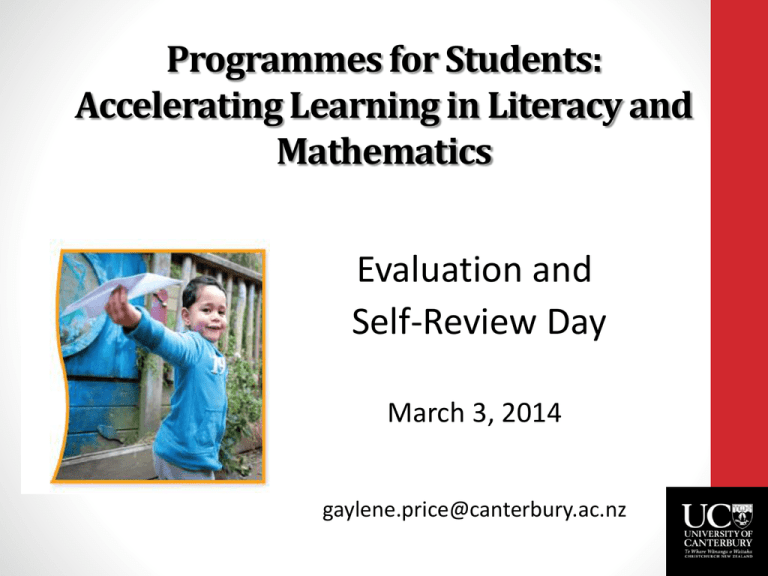
Programmes for Students: Accelerating Learning in Literacy and Mathematics Evaluation and Self-Review Day March 3, 2014 gaylene.price@canterbury.ac.nz Accelerating Learning in Literacy… • Is based on a ‘Theory of Action’… • A short term intervention (15 weeks) in addition to students’ current literacy teaching ... • Uses a process of inquiry … • Engages whānau … • Is responsive to student needs … • Has some external support … Accelerating Learning in Literacy (ALL) is… ‘A school inquiry and knowledge building programme that accelerates progress for a target group of students, (Year 1) … and sustains cycles of inquiry for breadth and coherence.’ (Year 2&3 - a school curriculum and achievement programme) Rationale for Programmes for Students • There is a national problem that needs solving • There is often confusion about how to respond to particular student needs • There is a propensity not to respond differently • The system has not developed a mediating layer to support capability building National, regional & local student achievement data show pockets of success Equity – is it good enough? 90.0% 80.0% 70.0% Total 77.4% Māori Pasifika 73.6% 70.0% 68.2% 62.6% 63.6% 60.0% 59.7% 60.2% 50.0% 40.0% 30.0% 20.0% 10.0% 0.0% Reading Maths Writing 56.8% Borderfield’s Report (2008) • Uncertainty about how to respond to the numbers of students that were not making progress; • A culture of dependency on “second wave” interventions; • A lack of capability at the classroom level to assess and provide intensive, explicit literacy instruction; • A confusing clutter of mismatched, sometimes counterproductive interventions. Recommendation: That the MoE develop a conceptual framework that strengthens all aspects of literacy support. ERO Mathematics Report (2013) There is a propensity not to respond differently “…business as usual approached prevailed….most schools were able to identify their learners who were not achieving…but continued to use the same strategies, programmes and initiatives they had tried before. Few had evidence that these actually accelerated the progress of their priority learners…” ERO Report – Accelerating the progress of Priority Learners in Primary Schools (May 2013) ‘A system–wide emphasis on the strategies teachers can use to accelerated progress is needed. All teachers have an ethical responsibility to help those students that need to catch up to their peers. This is essential if we are to raise the achievement of NZ students relative to their international counterparts.’ (p.21) Therefore… • the system needs do things differently. It needs to focus on all students and build capability through a system response that is contextualised to meet individual needs. Questions to consider • Is the intervention appropriate for the identified students? • What is the impact of each of these interventions and what evidence do we have that they are successful? • What next for the students for whom the intervention wasn’t successful? Curriculum and Achievement Plan Curriculum and Achievement Plan • Many schools already have elements of a CaAP • A school wide plan showing the NZC (and school curriculum) • Brings together an assessment plan – but includes responses to achievement • Shows outcomes – what schools want students to achieve (graduate profile) • Helps schools plan for and be accountable for all supplementary supports • Keeps the focus on ‘what works’ • Supports schools to pick up the pace for all students to achieve nzcurriculum.tki.org.nz (Pages 7-10 ‘Theory of Action’) National Leader reflections on 2013 Strengths: • Student achievement • Student and teacher agency • Appreciation of regionally based delivery • High levels of engagement and positivity • Uptake of the key understandings in the ‘Theory of Action’ • Priority learners So… What worked for whom? • close analysis of students capabilities to determine needs … and then teaching to these • innovative and exciting contexts and content chosen as the ‘vehicle’ of learning • a focus on goal setting by students • a focus on oral language • providing opportunities for fluency and mileage • well planned and structured lessons where careful scaffolding occurred (and continual modifications) • quality literature as foundation material • some schools had considerable success in the development of a strong home link Areas for improvement: • Scripted, shallow, skill-based programmes that can be bought and followed • Acceleration • Overall teacher judgements • Teaching as inquiry • Inquiry teams • What does ‘in addition’ mean? Intervention Logic for ALL and ALiM 2014 Enacting the Theory of Action • Supplementary inquiry team • Teaching as Inquiry • BES Principles and Conditions of Learning • Curriculum and Achievement Plan (CaAP) • Self-review tool • A focus on acceleration Supplementary Inquiry Team The key role of this team is to ensure there are adequate conditions for sustaining and embedding effective practices. (e.g. one role of this group is to support other classroom teachers to inquire into the effectiveness of aspects of their practice and transfer learnings from the supplementary programme to the classroom.) ToA Pg.12 Identify the level of support groups of students will need to access this learning focus Describe what students know and do (describe the rich resources students can bring to the next learning experiences) Using “Teaching as Inquiry” to trigger supplementary supports for some students BES Principles and conditions of learning • How well are we using what we know works? • Which levers are we currently using in our work? • Which ones do we need to focus more on or include? Schools’ inquiry should be focused on doing something differently, but pedagogically sound in response to the PfS inquiry focus. ALL 1 & ALiM 1 Inquiry “What is acceleration and how do we achieve it?” ALL 2&3/ALiM 2 Inquiry “How do we develop effective intervention practices that sustain students acceleration and ensure intervention coherence at a school-wide level? Our kids are …part of a system that ensures our kiwi kids can fly… He waka eke noa Ki te hoe Reporting requirements REPORT: • Inquiry and Refocus report (Developed from 2013) • Completed over the intervention - forming the basis of discussion for the ‘Impact and Refocus’ day (Discuss with Mentor) • Has a space for school ‘tool’ data • Has a space for OTJ (and a ‘best fit’ OTJ) Email to accelerating.literacy@minedu.govt.nz Include a final OTJ! DATA COLLECTION: NZCER will be assisting in the collection of assessment data for the project. 1. You will receive an email to confirm information they have received from the MOE about your school 2. You will be asked to complete a web form link which provides NZCER with your school's initial contact and intervention focus details Please submit this information before the 14th March 2014. Contacts for queries: Melanie Dickinson & Sandy Robbins assessmentservices@nzcer.org.nz DATA COLLECTION: NZCER will be collecting ALLdata for : • Reading (Years 3-8) using STAR and OTJs • Writing (Years 3-8) using e-asTTle and OTJs • Junior Literacy (Years 0-2) using Obs survey and OTJs You need to know if you are ALL Year 1, Year 2, Year 3 .. Further information about ALL… • nzcurriculum.tki.org.nz/system-of-support • Literacy on line – system of support • www.educationcounts.govt.nz (look under Topics/Public Achievement Information) • www.educationcounts.govt.nz/topics/BES Implementing a system of support Gazette articles • July 29, 2013 • August 26, 2013 • November 11, 2013 Rere atu, rere mai Taku manu e Rere ki tua, rere ki kō Kia whetūrangitia e Fly my bird In every direction. Attain The countless stars.
